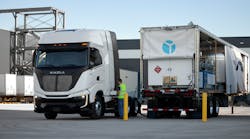When a fleet has decided it’s time to transition to an alternative fuel, one of the big questions is: How will refueling differ from traditional vehicle fleets like gasoline or diesel. With propane autogas, the questions about refueling can be put to rest quickly. That’s because one of propane autogas’ most attractive advantages for fleets is its refueling versatility.
This alternative fuel, with a track record of lowering a fleet’s total cost of ownership, offers a whole host of on-site refueling options. The right one depends on the fleet’s specific refueling needs.
Companies considering adding propane autogas vehicles to its fleet can determine the best refueling infrastructure for its organization by working with a propane retailer to determine if on-site private stations, private refueling networks or using existing public infrastructure is best, based on a fleet’s size, routes, budget and facility space.
ON-SITE INFRASTRUCTURE
Propane autogas on-site infrastructure is the most affordable to install of any fuel, and a centralized location offers convenience and reduced downtime for drivers. Depending on fleet size companies can find that either a standard private station or an advanced private station best fit its needs. For both, fleets can either lease infrastructure from a propane retailer or purchase its own infrastructure.
A standard private station works best for smaller fleets. Refueling stations with 1,000- to 2,000-gallon capacity tanks and a single dispenser are compact and able to support fleets of a smaller size without taking up much more space than a parking stall.
In some cases, a fleet’s propane retailer may help pay for some of the costs associated with refueling infrastructure. Upfront costs for fleets using infrastructure provided by propane retailer range from $1,500 to $5,000, with equipment affordably leased.
By contrast, costs for fleets buying its own infrastructure, including propane tanks, pump, motor and dispenser, range from $25,000 to $50,000, on top of the costs of site preparation.
For larger fleets, an advanced private station makes sense. These advanced stations provide greater fuel storage capacity and other amenities not found in the standard private station. Site preparation for a multiple-dispenser setup will typically cost between $3,000 and $7,500.
Total infrastructure costs can range from $50,000 to $200,000, depending on the complexity of the infrastructure. Amenities with these larger stations can include a canopy, propane tank, pump, motor and dispenser with card lock and vehicle tracking capability.
REFUELING NETWORKS
A refueling network can be a good option for fleets with limited space, or larger fleets with extensive routes and service areas that may not “return to base” at the end of a workday. Refueling networks are either public or private, but all offer the advantage of 24/7 access, typically through a card-lock system.
A public refueling network is operated by propane retailers and often allows fleets to identify and maintain records of vehicles by VIN, driver, fuel type and gallons dispensed, as well as the date and time of the transaction. Because the infrastructure is already in place, there is no cost to the fleet.
A private refueling network owned and operated by the fleets themselves, or by a group of fleets that come together and share the costs involved. Like a public network, a card-lock system allows fleets to easily identify and maintain vehicles’ refueling records in a private network.
Private networks are ideal for fleets running longer routes across large service areas. Plus, and they offer fleets the ability to tailor the complexity of the refueling stations and its locations to optimize the fleet’s routes and reduce downtime spent at the pump.
With so many options for refueling, fleet managers can comfortably move away from traditional fuel vehicles and select a refueling model that best fits their fleet’s needs. Tailoring a refueling strategy that makes sense for a fleet’s individual refueling needs helps fleets reap all of propane autogas’ benefits, including a quick return on investment and low total cost-of-ownership throughout the life of a vehicle.
For more information on propane autogas vehicles, incentives and refueling, visit propane.com/on-road-fleets/refueling.
Michael Taylor is the director of autogas business development for the Propane Education & Research Council (PERC) – a leader in propane safety, training programs and products (www.propanecouncil.org). Taylor assumed his role in April 2012. In the director’s role, Michael is charged with developing and maintaining sustainable growth through the development of commercialization practices and support systems for propane autogas technology, systems and vehicles throughout the United States. From 2008 through 2012, Michael served as director of fleet management at Heritage Propane. Prior to his tenure with Heritage Propane, Michael enjoyed a 22-year career in the school transportation industry.



